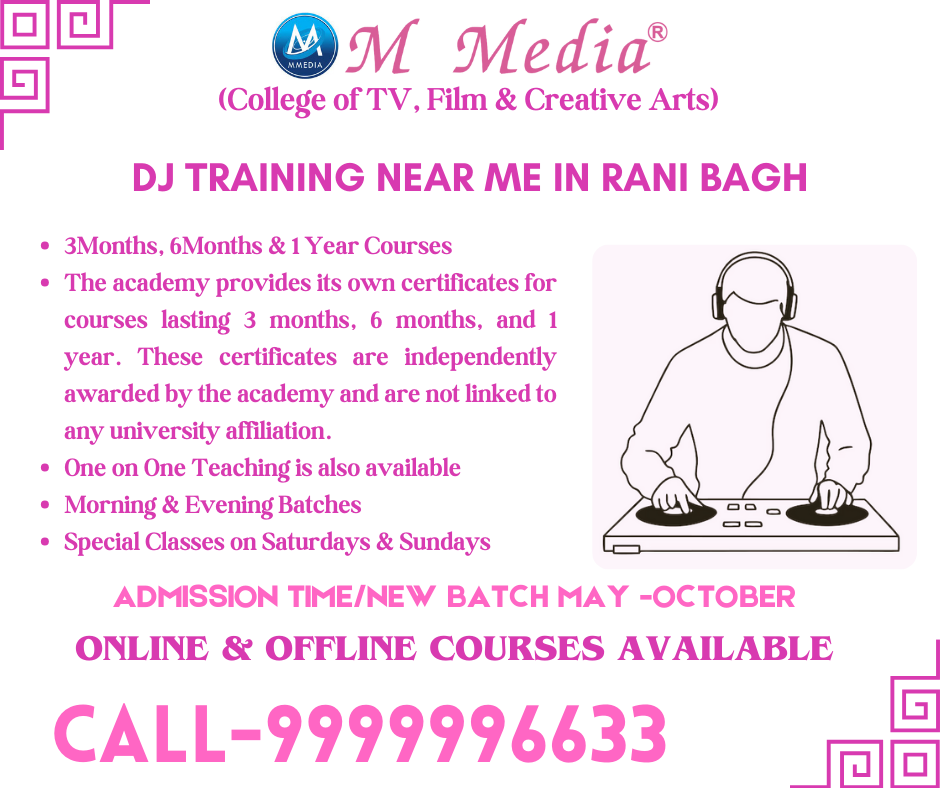
INTRODUCTION:
Dj Training Near Me In Rani Bagh refers to the process of teaching individuals the necessary skills, techniques, and knowledge to become proficient DJs. This training typically covers a wide range of topics including understanding DJ equipment, music selection, beatmatching, mixing, creating live performances, and using DJ software. DJ training programs are available for all levels, from beginners to advanced DJs, and can be found in-person or online. They provide structured learning environments where students can hone their craft and learn how to DJ professionally.
IMPORTANCE:
1. Professional Skill Development
DJ training is crucial for acquiring the technical skills needed to perform at a professional level. By learning the right techniques, students can avoid mistakes, understand the equipment, and learn to manage their performance effectively. Without proper training, aspiring DJs may struggle to master basic skills like beatmatching, sound quality, or creating smooth transitions between songs.
2. Confidence Building
One of the primary challenges for new DJs is performing in front of an audience. DJ training builds confidence by providing practice in a safe, structured environment. Students learn how to handle live performances, manage their stage presence, and develop strategies for reading the crowd and adjusting their sets accordingly. As they gain experience through training, their confidence grows, making them better prepared for real-world gigs.
3. Mastery of Equipment and Software
Modern DJing involves using a combination of physical equipment (turntables, mixers, controllers) and software (Serato, Traktor, Rekordbox). DJ training teaches students how to operate both the hardware and software seamlessly. A solid understanding of the technology allows DJs to troubleshoot issues during live performances and optimize their setups for the best sound quality.
4. Industry Insights and Networking
DJ training programs often involve networking with professionals in the industry, providing students with insights into how the DJing business works. Instructors typically share their experiences, tips, and advice on how to get gigs, build a brand, and manage a career in the music industry. Additionally, students can connect with other aspiring DJs, forming relationships that may lead to collaborations and opportunities.
5. Learning Different DJ Styles
Training programs often expose students to various DJ styles, such as turntablism, digital DJing, and live performance sets. Exposure to different methods allows students to experiment with different techniques and find their own unique style. This flexibility enhances creativity and allows DJs to stand out in the competitive industry.
BENEFITS:
1. Faster Skill Acquisition
DJ training accelerates the learning process. Instead of figuring things out by trial and error, students benefit from structured lessons that teach them the core fundamentals of DJing. With guidance from experienced instructors, they can skip the common mistakes that beginners often make and reach proficiency faster.
2. Enhanced Music Knowledge
A good DJ not only knows how to mix tracks but also understands the music they are playing. DJ training often includes lessons on music theory, tempo, key matching, and how to read a crowd’s energy. This knowledge helps DJs select the right tracks and create more engaging, dynamic sets.
3. Access to Professional Equipment
Many DJ training programs provide students with access to industry-standard equipment. This hands-on experience is invaluable because it allows students to practice on the same tools they will use in professional settings. This exposure helps them become comfortable with equipment, enabling them to troubleshoot any issues that may arise during a performance.
4. Career Advancement Opportunities
Completing DJ training can significantly improve career prospects. Whether you’re aiming to DJ at clubs, festivals, or private events, a proper training program provides you with the skills and credibility to land gigs. Some DJ training courses even offer job placement assistance or connections to agents, which can help students get their first opportunities in the field.
5. Personalized Feedback
Through DJ training, students receive personalized feedback from instructors who are experienced in the field. This feedback is essential for improving technique, stage presence, and overall performance. Instructors can identify areas that need improvement and offer specific advice for refinement.
6. Exposure to a Broader Range of Skills
DJing is more than just mixing songs. It involves a wide range of skills, such as creating playlists, engaging with an audience, producing original mixes, and even managing a music library. DJ training covers all of these aspects, giving students a well-rounded education that sets them up for success in the industry.
7. Building a Portfolio
As part of their training, students often have the chance to create and record their own DJ sets, which can then be used to build a professional portfolio. This portfolio is an essential tool for landing gigs, as it showcases the DJ’s talent and style. Many training programs also help students market their portfolios, providing guidance on social media presence and branding.
8. Increased Job Market Competitiveness
In a competitive industry like DJing, having formal training can set you apart from other DJs who have learned through self-study. Employers, event organizers, and club owners often prefer DJs who have received professional training because it shows dedication, skill, and the ability to handle live performances.
9. Greater Job Satisfaction
With the proper training, DJs are more likely to enjoy their work because they feel competent, confident, and capable. This job satisfaction extends to performing in front of crowds, mixing tracks effortlessly, and expressing creativity without technical limitations. Training also provides DJs with the tools to keep learning and evolving throughout their careers.
10. Exposure to DJing in Various Environments
Training programs often teach students how to adapt their DJing for different types of events—whether it’s a club, wedding, corporate event, or festival. Understanding how to adjust music selection, set energy levels, and manage different types of audiences is an essential skill that enhances a DJ’s versatility and employability.


